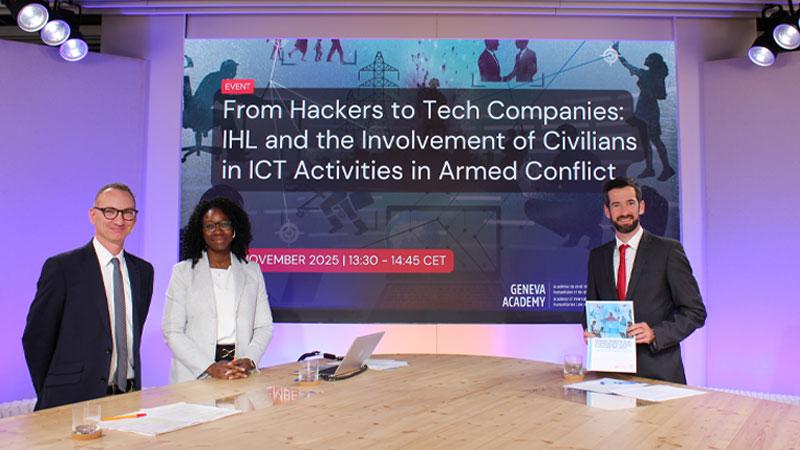The University of Westminster’s Professor Marco Roscini has co-drafted a report with the International Committee of the Red Cross (ICRC) on civilian involvement in cyber warfare and how this raises risks under international humanitarian law (IHL). The report’s launch event brought together diplomats, militaries, tech companies and academics to discuss its findings and propose ways to reduce civilian harm.

Titled IHL and the Growing Involvement of Civilians in Cyber Operations and other Digital Activities in Armed Conflict, the report responds to the growing trend of civilians being drawn into armed conflicts through digital means. This ranges from collecting militarily relevant information and “hacktivist” groups to technology companies providing services and infrastructure to states or peoples engaged in armed conflict, raising serious risks for civilian protection under international humanitarian law.
As part of a joint research project from the Digitalisation of Conflict: Humanitarian Impact and Legal Protection cluster, the team carried out extensive research and expert consultations to examine how IHL applies to civilian involvement in cyber and other digital activities during armed conflicts. The cluster was a partnership between the ICRC and the Geneva Academy of International Humanitarian Law and Human Rights, at which Professor Roscini was the Swiss Chair of IHL between 2022 and 2024.
The launch was marked with an online event aimed at tackling pressing legal questions and advancing practical proposals for states, technology companies and humanitarian actors to limit civilian involvement in cyber warfare, reduce harm and prevent violations of IHL.
Professor Marco Roscini is a Professor of International Law at the University of Westminster. Earlier this year, Professor Roscini was appointed Senior Fellow at NATO’s Cooperative Cyber Defence Centre of Excellence (NATO CCDCOE) and is co-Director of the Hague Academy of International Law's Centre of Studies and Research 2025 on AI and International Law.
About the report, Professor Roscini said: “This report, which I contributed to writing in the framework of our research project on the digitalisation of armed conflict, highlights a critical turning point in contemporary conflicts. The battlefields of today extend far beyond physical frontiers and draw civilians closer to the hostilities. As civilian participation in digital activities grows, so do the risks too. Applying international humanitarian law in cyberspace is therefore essential to protect populations, preserve the integrity of civilian infrastructure and uphold the fundamental principles that regulate armed conflict. The stakes are no longer only on the ground—they are online, and they potentially affect us all.”
Professor Roscini’s work with the Red Cross contributes to the United Nations Sustainable Development Goals (SDGs) 16: Peace, Justice and Strong Institutions and 17: Partnerships for the Goals. Since 2019, the University of Westminster has used the SDGs holistically to frame strategic decisions to help students and colleagues fulfil their potential and contribute to a more sustainable, equitable and healthier society.
Find out more about Law courses at the University of Westminster.


